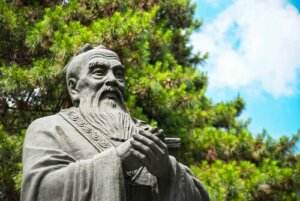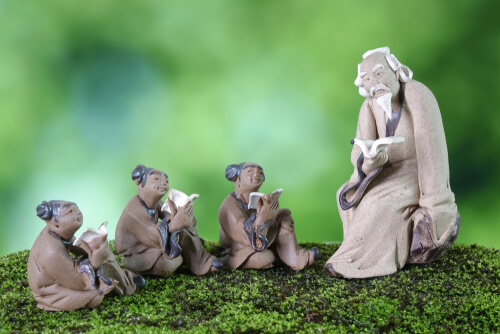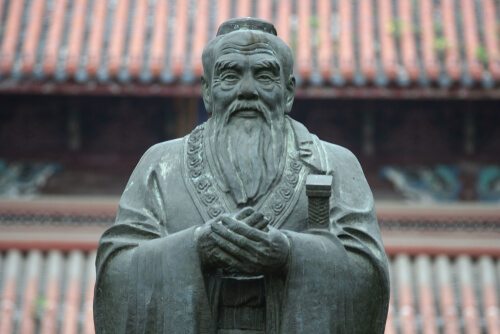Confucius: Biography of an Extraordinary Philosopher

Confucius was born in the 6th century BC, way before our time. Nevertheless, even today, more than two millennia later, he’s still cited as a source of wisdom. His thoughts were universal and had a totally timeless quality. In fact, he built and preached a series of values that were desirable and necessary for the smooth running of society.
To understand the magnitude of the greatness of this philosopher, it’s enough to say that he was one of the few Eastern thinkers who decisively penetrated Western philosophy. For example, several of his ideas were captured in the famous, I Ching, an extremely popular book in the Western world.
“You ask me why I buy rice and flowers? I buy rice to live and flowers to have something to live for.”
-Confucius-
There’s no doubt that Confucianism exerted a great influence on Christian doctrine. Indeed, many of the values that are proclaimed in Christianity derive from the philosophy of Confucius.
For this reason, he can be considered one of the greatest philosophers of all time, to the point that, today, we still have much to learn from him.

Confucius
Confucius was born in the year 551 BC, in a small Chinese village in Lu County, now called Shan-tong.
He was a child of the second marriage of his father who was already over 60 years old when he was born. His wife was extremely young and poor. Confucius’ original name was K’ung Fu-tzu, but when Latinized it became ‘Confucius’.
Confucius’ father already had nine daughters from his first marriage, but he didn’t want to die without having a son. Therefore, he made arrangements with a poor widower, who gave him his youngest daughter who was only 13 years old. She was the mother of Confucius. His father died when he was only three.
On his father’s side, K’ung Fu-tzu came from a noble lineage. His ancestors included a stepbrother of the last emperor of the Shang dynasty and a relative who was the Duke of Shung.
Despite this, Confucius’ father’s death left his mother with great financial difficulties. However, she managed to give him an excellent education, complemented by the fact that the boy showed self-teaching tendencies from a very young age.
Functionary and thinker
Confucius is said to have been a great lover of books from his earliest years and to have celebrated the complex rituals of his time alone. It’s also said that he wasn’t particularly handsome because he had a rather large head. On the other hand, his clear intelligence and ease with words gave him another type of charm.
When he was 19, he married a young woman about whom virtually nothing is known. They had a son named Po Yu and, soon after, the woman left the philosopher, possibly to return to her parents’ house.
Not much is known about the son of Confucius either. On the other hand, his son, grandson of the philosopher, was one of the great glories of Confucianism. His name was: Kong Ji.
The first position that Confucius held was that of a stable manager, a trade in which he acquired a reputation as a wise and honest man. His mother died and he went into mourning for three years, as was stipulated at the time.
After this period, he dedicated himself more vigorously to philosophy. At this time, he acquired his first disciples, among whom were two ministers of the imperial court.

An eternal teaching
The number of the philosopher’s disciples grew, but the duke of his hometown was overthrown and Confucius was forced into exile. The next 15 years were spent traveling until he was able to return to his country, which was ravaged by conflict and corruption.
Confucius was given a position that today would be the equivalent of Minister of Justice. He exercised it in such a virtuous manner that he won the admiration and applause of his contemporaries.
Prosperity reigned. However, jealous of his power, the nobles began to plot against him. Disappointed, Confucius set out again with his disciples. They wandered back and forth for the next 13 years. Confucius proclaimed that he wanted to find a ruler who’d be willing to be guided by his principles, but never found one.
Saddened again, he decided to return to his land. It’s said that one day some hunters caught an extremely strange animal and the philosopher interpreted this as a sign that he was going to die. This was, indeed, the case, and Confucius was buried on the banks of the Si River. His disciples mourned for three years.
The cult of Confucianism began really early in China. Furthermore, Confucius was maintained as the highest spiritual leader of that nation until the 20th century.
Confucius was born in the 6th century BC, way before our time. Nevertheless, even today, more than two millennia later, he’s still cited as a source of wisdom. His thoughts were universal and had a totally timeless quality. In fact, he built and preached a series of values that were desirable and necessary for the smooth running of society.
To understand the magnitude of the greatness of this philosopher, it’s enough to say that he was one of the few Eastern thinkers who decisively penetrated Western philosophy. For example, several of his ideas were captured in the famous, I Ching, an extremely popular book in the Western world.
“You ask me why I buy rice and flowers? I buy rice to live and flowers to have something to live for.”
-Confucius-
There’s no doubt that Confucianism exerted a great influence on Christian doctrine. Indeed, many of the values that are proclaimed in Christianity derive from the philosophy of Confucius.
For this reason, he can be considered one of the greatest philosophers of all time, to the point that, today, we still have much to learn from him.

Confucius
Confucius was born in the year 551 BC, in a small Chinese village in Lu County, now called Shan-tong.
He was a child of the second marriage of his father who was already over 60 years old when he was born. His wife was extremely young and poor. Confucius’ original name was K’ung Fu-tzu, but when Latinized it became ‘Confucius’.
Confucius’ father already had nine daughters from his first marriage, but he didn’t want to die without having a son. Therefore, he made arrangements with a poor widower, who gave him his youngest daughter who was only 13 years old. She was the mother of Confucius. His father died when he was only three.
On his father’s side, K’ung Fu-tzu came from a noble lineage. His ancestors included a stepbrother of the last emperor of the Shang dynasty and a relative who was the Duke of Shung.
Despite this, Confucius’ father’s death left his mother with great financial difficulties. However, she managed to give him an excellent education, complemented by the fact that the boy showed self-teaching tendencies from a very young age.
Functionary and thinker
Confucius is said to have been a great lover of books from his earliest years and to have celebrated the complex rituals of his time alone. It’s also said that he wasn’t particularly handsome because he had a rather large head. On the other hand, his clear intelligence and ease with words gave him another type of charm.
When he was 19, he married a young woman about whom virtually nothing is known. They had a son named Po Yu and, soon after, the woman left the philosopher, possibly to return to her parents’ house.
Not much is known about the son of Confucius either. On the other hand, his son, grandson of the philosopher, was one of the great glories of Confucianism. His name was: Kong Ji.
The first position that Confucius held was that of a stable manager, a trade in which he acquired a reputation as a wise and honest man. His mother died and he went into mourning for three years, as was stipulated at the time.
After this period, he dedicated himself more vigorously to philosophy. At this time, he acquired his first disciples, among whom were two ministers of the imperial court.

An eternal teaching
The number of the philosopher’s disciples grew, but the duke of his hometown was overthrown and Confucius was forced into exile. The next 15 years were spent traveling until he was able to return to his country, which was ravaged by conflict and corruption.
Confucius was given a position that today would be the equivalent of Minister of Justice. He exercised it in such a virtuous manner that he won the admiration and applause of his contemporaries.
Prosperity reigned. However, jealous of his power, the nobles began to plot against him. Disappointed, Confucius set out again with his disciples. They wandered back and forth for the next 13 years. Confucius proclaimed that he wanted to find a ruler who’d be willing to be guided by his principles, but never found one.
Saddened again, he decided to return to his land. It’s said that one day some hunters caught an extremely strange animal and the philosopher interpreted this as a sign that he was going to die. This was, indeed, the case, and Confucius was buried on the banks of the Si River. His disciples mourned for three years.
The cult of Confucianism began really early in China. Furthermore, Confucius was maintained as the highest spiritual leader of that nation until the 20th century.
All cited sources were thoroughly reviewed by our team to ensure their quality, reliability, currency, and validity. The bibliography of this article was considered reliable and of academic or scientific accuracy.
Chengley, L. (2006). La historia de Confucio. LD Books.
This text is provided for informational purposes only and does not replace consultation with a professional. If in doubt, consult your specialist.







